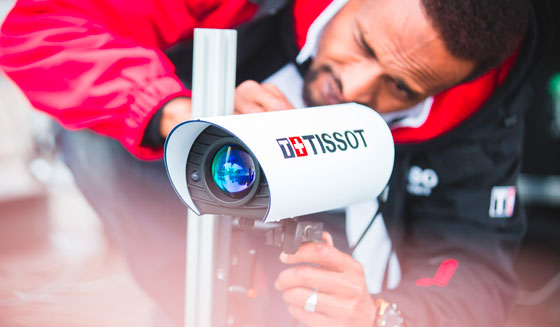
This year, Tissot will once again serve as official timekeeper for “La Grande Boucle” (the big loop). The entire range of technology developed in partnership with its sister company within the group, Swiss Timing, will be dedicated to this sports event watched by more than 12 million viewers.
Tissot was created in 1853 and forged early ties with the world of sport, but it was only in 1938 that the watchmaker became involved in sports timekeeping, going on to become a key player in this field.
The brand’s current sports calendar currently comprises a multitude of events and a broad range of disciplines. In addition to its partnerships as official timekeeper for basketball with the NBA, FIBA and CBA; in cycling with the Tour de France and the UCI world championship; in motorsports with the MotoGP and FIM Superbike world championships; as well as in rugby with the RBS 6 Nations Championship, the Top 14, European Rugby Champions Cup and the European Rugby Challenge Cup, Tissot also sponsors the fencing and ice hockey world championships, which entrust it with handling both timekeeping and overall data management.
The brand also provides timekeeping services for the most widely followed multi-disciplinary events such as the 2013 Summer and Winter Universiades, the biggest international multi-sports competition for students; for the 2007 Pan American Games in Rio de Janeiro; as well as for the Asian Games in 1998, 2002, 2006 and 2014.
In an age when competition timing and results transmission are becoming ever more complex, Tissot, in partnership with Swiss Timing, a sister company within the Swatch Group, has succeeded in remaining firmly on the cutting edge of progress and in ensuring impeccable precision on all levels.
Since 2016, Tissot has been serving as official timekeeper for the Tour de France (TdF), the highlight of the annual cycling calendar. For the 104th edition of this sports event that will run from July 1st to 23rd 2017, the Maison from Le Locle will place its expertise in competitors’ service so as to guarantee supreme precision in recording arrival times. The timing of time trials will be done using photoelectric cells, while the photo-finish technology will guarantee the exactness of classic road races, both methods being teamed with a transponder system.
Each bike is equipped with a small transponder featuring a unique signal. When the bike arrives within 50 metres of the finish line, an antenna installed on the track captures the signal from the emitter, thus identifying the competitor. The antenna is connected to a decoder which sends the signal to the transponder-based timing computers located in the control room. For time trials, when the bike crosses the finish line a few seconds later, the timing team has only a few seconds to deliver the results – a tough ask when several athletes cross the finish line simultaneously. That it exactly where the photo-finish technology comes into play. This camera providing 1,000 images per second enables millimetre-accurate detection of which cyclists crossed the finish line first, a detail that is impossible to define based on the real image alone.
Independently of final results, Tissot also supplies a wealth of information to race organisers, commentators and spectators, such as split times, mean times or the gaps between competitors. Prior to the race start, the team names, competitor names and nationalities, as well as the list of cyclists at the start of each stage, are also indicated.
All this precise data is processed from the control room located near the finish line and housing the photo-finish supervision equipment, the transponder-based timekeeping, as well as all the printers and computers required to guarantee the veracity of the results.
Given that and point counting call for ultimate precision across all disciplines, the role of official timekeeper calls for particularly rigorous standards. Tissot has demonstrated its capacity to offer absolute precision and has thus become a trusted partner for the most popular sports, for which it also produces official timepieces – witness the special editions issued for the Tour de France.
Alongside its sporting commitments, the watchmaker has established partnerships with athletes from a range of disciplines, including Tony Parker, Jorge Lorenzo and many others.
TdF: key figures
Number of spectators: 12 million
Overall length of the route: 3,500 km
Number of timekeeping specialists: 10
Hours of televised coverage: 4,700
Number of media present: 2,100
Television viewing audience: 3.5 billion
Number of TV channels: 92
Timekeeping equipment: 2,184 tons
Number of photo-finish decisions: 4,253
June 29, 2017


 News
News